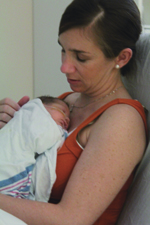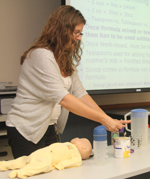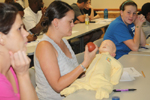|
By
Cindy
Abole
Public Relations
It can be stressful
becoming a new parent. Add the presence of premature triplets and that
stress level is tripled.
Just ask Folly Beach's Amy and Joey Foxhall, who became the proud
parents of triplets born May 18 at MUSC.
Fortunately, they took
advantage of MUSC's Neonatal-Perinatal Medicine's new discharge program
that arms parents with the latest information to give their babies the
healthiest start in life, particularly families such as the Foxhalls.
Foxhall's pregnancy was considered very high-risk as her babies, Luke,
Laney and Jennings, were born about 10 weeks premature.
 Six-week-old
Luke Foxhall with his mom, Amy. Six-week-old
Luke Foxhall with his mom, Amy.
Since the birth of their
babies, the Foxhalls have spent every day with their newborns, first
for several weeks at the neonatal intensive care unit and later in the
university hospital's fifth floor level 2. Throughout this time, the
couple has had much to learn about the delicate care of their premature
newborns from understanding preemie infant behavior and feeding to the
stages of infant development. As they prepare to take their babies
home, the Foxhalls attended the June 26 discharge class along with
other caregivers.
"I found the class to be
especially helpful to new parents," said Foxhall. "The doctors and
staff have been wonderful throughout this entire experience."
Neonatologist Sarah
Taylor, M.D., is one of many specialists who supports this hour-long
educational program in MUSC's Division of Neonatology taught by a team
of specialized nurses and caregivers. According to Taylor, about 80
percent of discharge instructions were given to families 48 hours prior
to discharge. Neonatology studies have shown that families retain about
10 percent of information given during this time period. Other studies
indicate that a mother's degree of stress during the week of a preterm
infant's hospital discharge is equal to the stress at the time the
infant was born.
 Cecilia McMillan shows the class
how to measure water with the baby formula. Cecilia McMillan shows the class
how to measure water with the baby formula.
"The discharge class
allows us to give information to parents and caregivers weeks prior to
hospital discharge," Taylor said.
The class provides a
formal setting for parents to get tips and understand basic skills
about the general care of newborns. Parents learn about infant
nutrition, how to check the baby's temperature, give medications, keep
a growth chart, use a bulb syringe, safely use car seats and other
topics. At the conclusion of class, parents are asked to complete an
anonymous evaluation to provide feedback and improvements.
New mom Susan Watford
attended the June 22 discharge class in preparation for bringing home
newborn son, Bay.
"As a first-time mom, I found it so nice to get information to help me
prepare myself for taking care of my baby, especially since he was born
premature."
 New
mom Susan Watford, center, practices with a bulb syringe to remove
mucous and spit from a baby mannequin. New
mom Susan Watford, center, practices with a bulb syringe to remove
mucous and spit from a baby mannequin.
The class was originally
developed by neonatal nurse Christina Nelson, who along with other
nurses, taught the nursery discharge preparation class for parents.
Earlier this year, Nelson, who manages the hospital's Infant Home
Monitoring Program, approached pediatric dietitian Cecilia McMillan
about combining it into a nutrition and preemie baby care teaching
class to help educate parents prior to their baby's discharge.
According to Nelson, the class is offered during the week and on
weekends to accommodate working and out-of-town parents and caregivers.
The class also helps in the overall patient discharge process.
"We want well-informed,
comfortable parents, and this class gives parents an opportunity to
also hear other caregivers' questions that they may not have thought
about," Nelson said.
Classes began in May led
by Nelson, McMillan and other nurses—Mary Bates, Kathy Brady, Beth
Micalizzi, Lila Dodson, Maryann Kovacs, Laura Beason, Sandy
Ballard and Jo' Dee Herbert—who volunteer to help and teach.
Taylor said she's excited
MUSC is offering this new program. "The discharge class is an
incredible example of MUSC staff not only recognizing a problem, but
also taking extra steps needed to develop a solution to a problem,"
Taylor said. "The work these staff members take will have a
far-reaching effect in improving the confidence of our parents and the
safety of our patients."
|



 Six-week-old
Luke Foxhall with his mom, Amy.
Six-week-old
Luke Foxhall with his mom, Amy. Cecilia McMillan shows the class
how to measure water with the baby formula.
Cecilia McMillan shows the class
how to measure water with the baby formula. New
mom Susan Watford, center, practices with a bulb syringe to remove
mucous and spit from a baby mannequin.
New
mom Susan Watford, center, practices with a bulb syringe to remove
mucous and spit from a baby mannequin.